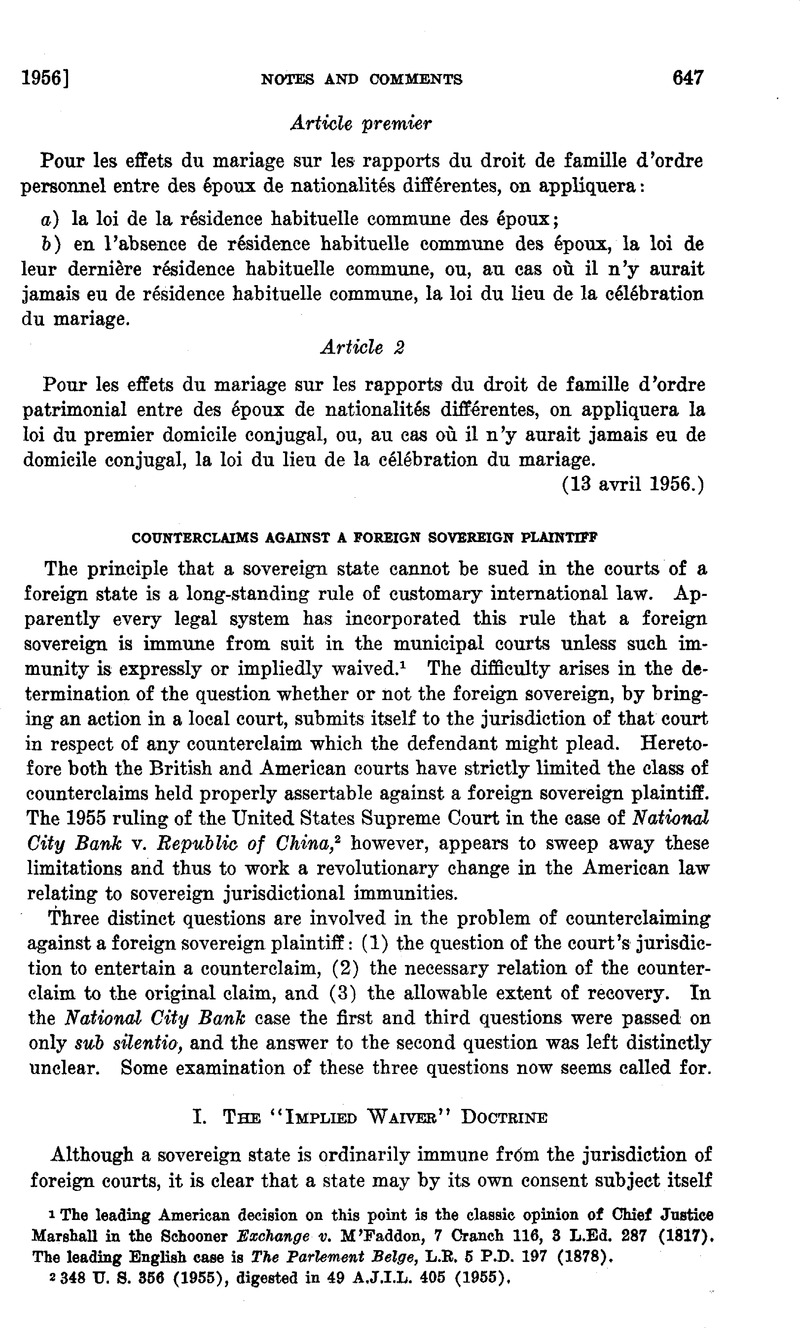No CrossRef data available.
Published online by Cambridge University Press: 28 March 2017

1 The leading American decision on this point is the classie opinion of Chief Justice Marshall in the Schooner Exchange v. M’Faddon, 7 Cranch 116, 3 L.Ed. 287 (1817). The leading English case is The Parlement Belge, L.R. 5 P.D. 197 (1878).
2 348 U. S. 356 (1955), digested in 49 A.J.I.L. 405 (1955).
3 South Africa Republic v. La Compagnie Franco-Belge, [1898] 1 Ch. 190.
4 People of Porto Rico v. Ramos, 232 U. S. 627 (1913).
5 Richardson v. Fajardo Sugar Co., 241 U. S. 44 (1915).
6 Dexter and Carpenter Inc. v. Kunglig Jarnvagsstyrelsen et al., 43 F.2d 705 (2d Cir. 1930).
7 Luckenbach Steamship Co. Inc. v. Norwegian Barque Thekla, 266 U. S. 328 (1924).
8 United States of Mexico v. Rask, 118 Cal. App. 21, 4 Pac. 2d 981 (1931).
9 Strousberg v. Republic of Costa Rica, 44 L.T.R. (N.S.) 199 (C.A. 1881); South Africa Republic v. La Compagnie Franco-Belge, [1898] 1 Ch. 190; Union of Soviet Socialist Republics v. Belaiew, 42 T.L.R. 21 (K.B. Div. 1925).
10 Henry S. Rowan v. Sharps Rifle Manufacturing Co., 29 Conn. 282 (1860).
11 U. S. v. The National City Bank of New York, 83 F.2d 236 (2d Cir. 1936).
12 U. S. v. New York Trust Co., 75 F. Supp. 583 (S.D.N.Y. 1946).
13 Republic of China v. Pang Tsu Mow et al., 105 F. Supp. 411 (D.C., 1952).
14 Hungarian People’s Republic v. Cecil Associates Inc., 118 F. Supp. 954 (S.D.N.Y. 1953); French Eepublic v. Inland Navigation Co., 263 Fed. 410 (E.D.Mo. 1920); Republic of China v. American Express Co., 195 F.2d 230 (2d Cir. 1952).
15 348 U. S. at 364.
16 Fed R. Civ. Proc. Rule 13(b); Clark, Code Pleading 653–660 (2d ed. 1951).
17 33 Dept. of State Bulletin 750–751 (1955).
18 L’Etat du Pérou v. Kreglinger, Court of Appeal, Brussels, 1857, Pasicrisie 348.
19 Von Hellfeld v. Den Fiskus des Russischen Reichs, Court of Conflicts, Prussia, 1910, Deutsche Juristen-Zeitung 15–808; English translation in 5 A.J.I.L. 490 (1911).
20 Letort v. Gouvernement Ottoman, Civil Tribunal, Seine, 1914, Revue Juridique Internationale de la Locomotion Aérienne, Vol. 5, p. 142.
21 U. S. v. Eckford’s Executor, 6 Wall. 484 (1868).
22 Republic of Haiti v. Pleach, 73 N.Y.S. 2d 645 (1947).
23 United States of Mexico v. Rask, 118 Cal. App. 21, 4 Pac. 2d 981 (1931).
24 Irish Free State et al. v. Guaranty Safe Deposit Co. et al., 215 N.Y.S. 255, 127 Misc. 86 (1925).
25 U. S. v. Nuestra Senora de Eegla, 108 U. S. 92 (1882).
26 Kingdom of Norway v. Federal Sugar Refining Co., 286 Fed. 188 (S.D.N.Y. 1923).
27 McLean v. Commonwealth of Australia, 293 Fed. 190 (9th Cir. 1923).
28 In the National City Bank case itself the Supreme Court could hardly have allowed affirmative relief for defendant bank on the counterclaims. Since in the Federal District Court the bank amended its pleadings to abandon all claim to affirmative relief, thus seeking only set-off, this question was not presented to the Supreme Court for review. Hence the ratio decidendi of the case cannot be read as extending further than set-off situations. The language of the majority opinion certainly does not go beyond this. Thus Justice Frankfurter says (at 361): “We have a foreign government invoking our law but resisting a claim against it which fairly would curtail its recovery.” (Emphasis supplied.) This might easily be read as restricting the rule of the case to defensive counterclaims. This is apparently what the dissent thinks. It says (at 369): “In the present case, the Court evidently feels that, since the counterclaim is limited to the amount of the Republic of China's claim, there is jurisdiction to allow a setoff to that extent.” (Emphasis supplied.)
29 Lord Russell once said he “had no information about the pitch of civilization attained by the State of Kelantan, but it was sufficiently high to make it prefer not to pay its just debts.” Duff Development Co. v. Government of Kelantan, 39 T.L.R. 96 (1922).
30 See, for example, the vigorous views of Professor (now Judge) Lauterpacht, in “The Problem of Jurisdictional Immunities of Foreign States,” 28 Brit. Year Book of Int. Law 220 (1951)Google Scholar.